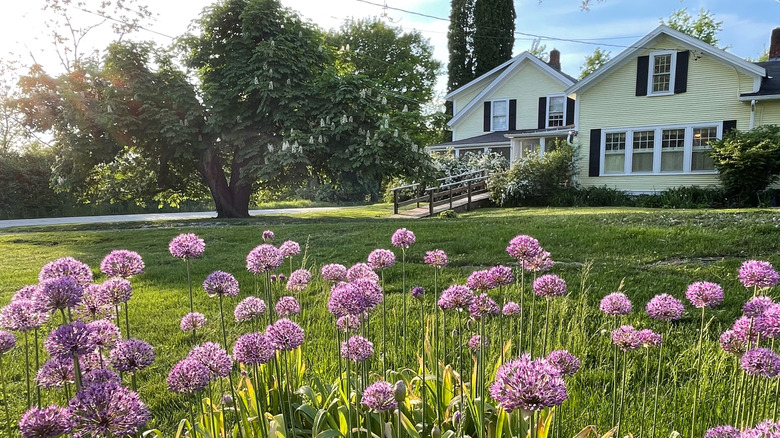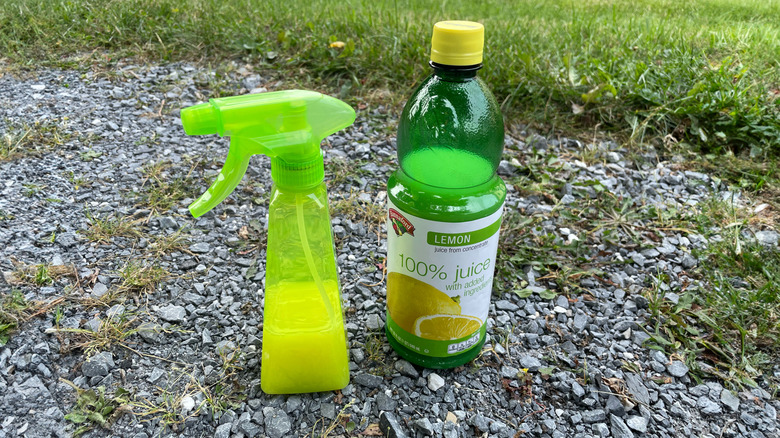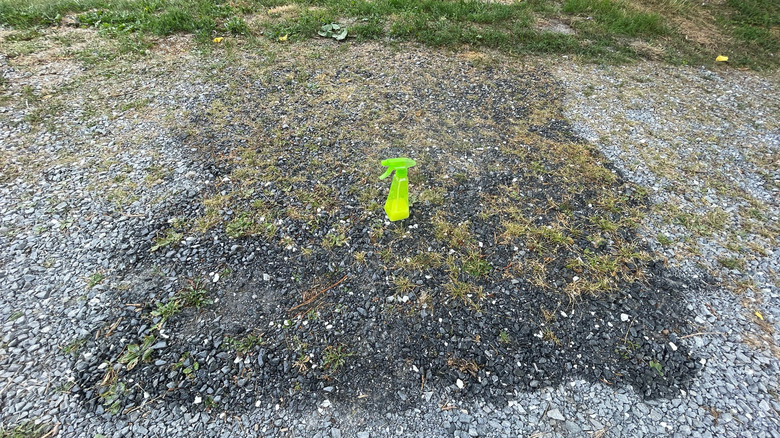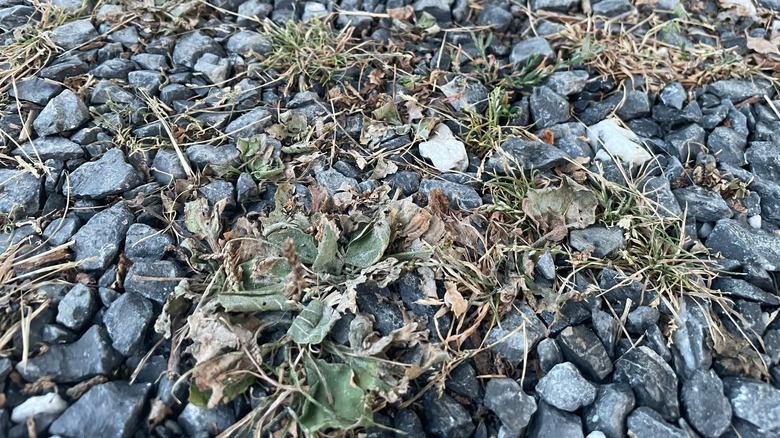We Used Lemon Juice To Banish Weeds From A Gravel Driveway. Was It Worth The Squeeze?
We may receive a commission on purchases made from links.
I'm pretty good at picking out annuals for the flower boxes. My pruning work on our ancient quince and lilac trees hasn't killed them off yet, and I can hype up our lawn guy about how great those stripes look in the yard with the best of them. But a green thumb, I am not. Nevertheless, I appreciate beautiful landscaping and try to minimize my family's exposure to harmful chemicals, so when House Digest asked me to figure out if lemon juice actually works to banish weeds, I was intrigued by the idea.
There are a lot of things to consider before spraying weed killer in your yard, including what type is best for your situation. Lemon juice is extremely high in citric acid, which can act as a nonselective organic herbicide that dries out foliage within a few hours to days. Like similar commercial weed killers, this creates a chain reaction that results in the weeds wilting and dying. Nonselective means it's likely to kill everything in its path, which was ideal for my main problem area: the driveway.
Someday, we'll get around to paving it. For now, we just refresh the gravel every few years, and within weeks, little tufts of grass start to sneak in. Not only does it ruin the overall look of the driveway, but it also makes the edges squidgy and undefined. I've had my eye on the Flame King Weed Burner Torch Kit from Amazon for a while, but the thought of firing up the driveway to desiccate a few weeds makes me a little nervous. Lemon juice is safe, cheap, and accessible, making it too tempting not to test out.
Gathering supplies and selecting a test zone
To begin my test, I gathered supplies from our local grocery store. A 32-ounce bottle of store-brand lemon juice was $3.19, and I spent $5 on a large plastic spray bottle that I'll be able to reuse again for other projects. Given the number of weeds I needed to tackle in the driveway, I picked up the largest bottle of lemon juice I could find. You won't get very far with one of those cute citrus-shaped ones. And although part of the appeal is the nontoxic aspect of this lemon juice, I didn't spring for organic because it was almost twice the price, and I figured the weeds wouldn't really care one way or the other.
My next step was to scope out a spot in the driveway where the weeds were particularly bad. I have to admit, after a long, hot, and humid summer, there were plenty of areas to choose from! Anticipating that the lemon juice might take a few days to work, I landed on a "test zone" that wouldn't be disturbed by cars pulling in and out or dogs offering their own particular brand of weed-killing services. Finally, I checked the forecast to make sure we were in for several sunny days in a row. I worried that a rainstorm would dilute the lemon juice too much or revive weeds once they had started to wilt.
Testing this hack on our driveway
Pouring lemon juice into the spray bottle was definitely the easy part. It turns out that covering a large area of gravel, making sure to thoroughly saturate each weed and tuft of grass, took way longer than I anticipated. I sprayed. And sprayed. And as I was spraying some more, I realized using a squirt bottle was an amateur move. I would have been much better off using a tool like the VAXMAY Battery Powered Sprayer from Amazon. The fresh lemony smell wafting up from the ground was delightful. But the hand cramps? Not so much.
I ended up using the entire 32-ounce bottle of lemon juice and only managed to cover about 6 square feet. Our driveway is a pretty standard size, and I couldn't help but wonder how expensive it would be to cover the entire thing with lemon juice. I'd certainly have to buy a lot more of it! I've read some articles suggesting that you can kill and prevent weeds from growing in gravel using a few kitchen staples, like vinegar and salt, but I used only straight lemon juice for this experiment. While I was waiting a few days to see if it would work, I read more than one gardening hot take that suggested these similarly nontoxic ingredients make for even more potent weed killers. Since vinegar has acetic acid that ruptures plant cells, and salt dehydrates them, combining them with lemon juice might be worth a try next time.
Should you try it?
For me, there won't be a next time. Did it work? Sort of. The lemon juice did a surprisingly great job of refreshing the look of our driveway, bringing back the dark, rich tone to the dusty gray gravel that's been dulled by our dirt road. And I've got a crispy brown spot in the driveway now where my "test zone" was sprayed. But on close inspection, only a few tufts of grass look halfway dead, while plenty of others are still waving their bright green blades in the breeze. Despite soaking them thoroughly, the broadleaf weeds are only slightly curled at the edges. And those larger weeds along the perimeter? They didn't even flinch.
A bottle of lemon juice is inexpensive and easy to find. If you had a small flowerbed or a mulched area with a few unwanted volunteers, I can see the appeal, especially if you're trying to avoid using harsh chemicals on your lawn. But if you're battling a large area that's covered in weeds, like I am, it just isn't a practical or cost-effective method. Even if you went all in with a lemon juice, vinegar, and salt mix to kill your weeds, you'll still probably need to remove them by hand.
There's really no way around it. Prevention is the key to keeping weeds under control. Do all you can to keep weeds from getting established, and you'll avoid the need to spray them with either chemicals or citrus. My advice? When life gives you lemons, make lemonade — not weed killer.



